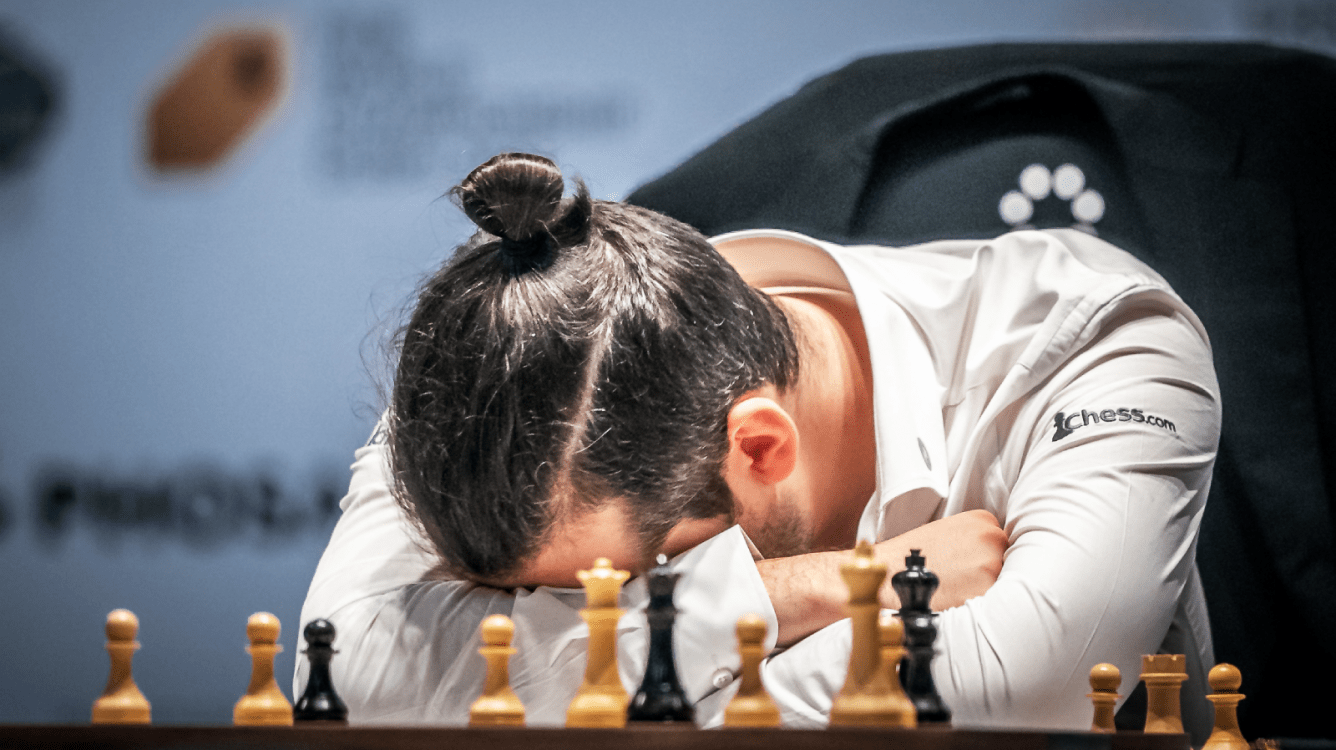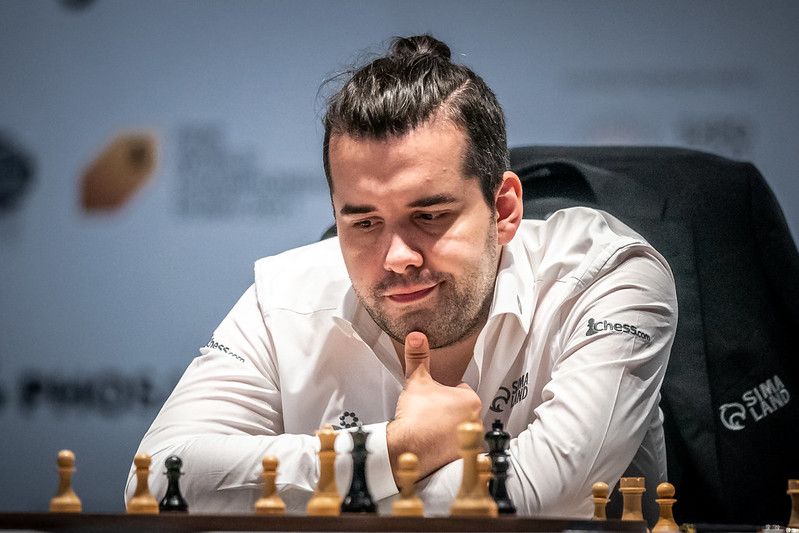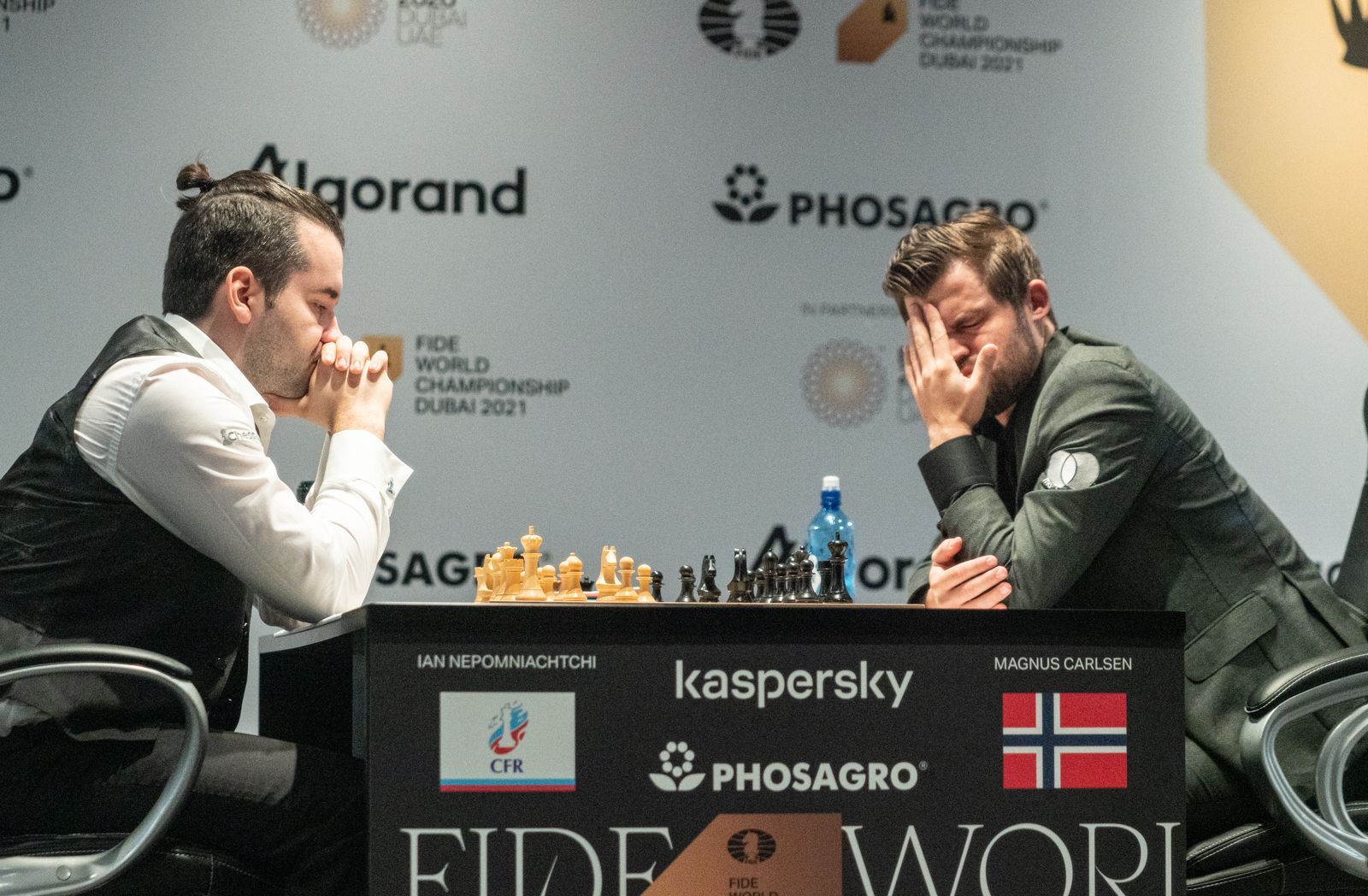
Nepomniachtchi: What Went Wrong?
Chess.com people are the best! I already wrote in my old article that our fellow members are nice, intelligent and always ready to help you. That's why I never miss your comments, my dear readers, since they are always interesting and I learn a lot from them.
For example, take the comments for my last article. I noticed there that our member @eilysiumm came up with a title for this article. I even checked if he left a draft of the article, but the rest of his comment was empty. I guess I will have to take it from here.

The first six games of the World Championship match were very tense and promising. The whole chess world was expecting an exciting culmination. Unfortunately, the finish of the contest was very disappointing. GM Ian Nepomniachtchi played some moves that were difficult to explain. I am sure you saw a lot of comments about huge blunders which he committed in games nine and 11. I was recently talking to a student of mine, and I heard from him probably the best description of the second part of the match. When I asked him about some of his moves that were questionable at best, he answered: "I watched the World Championship match. I guess I got poisoned."
All jokes aside, let's try to figure out the cause of the disaster that happened to the challenger. We'll investigate certain elements that heavily affected the match's outcome.
1) Openings
This was definitely the most important part of Nepomiachtchi's training. His team was able to use a supercomputer in Skolkovo (Russian version of Silicon Valley) and as a result, Ian perhaps had the most formidable opening preparation in the history of the world chess championship. In a recent interview, GM Daniil Dubov (one of GM Magnus Carlsen's seconds) said that it was a coordinated attack of a supercomputer and a brainstorm of a strong analytical team, but fortunately, Carlsen's opening armor turned out to be strong enough.

So, Nepomiachtchi's opening preparation deserves the highest possible mark, but there is always the other side of the coin. In a post-match interview, Ian admitted that he probably worked a bit too much before the match. That could be the reason why the challenger's play was lacking his usual creativity and freshness.
2) Public Attention
The last couple of months before the match, chess was probably one of the most popular topics in Russia. The slogan "Return the Chess Crown to Russia" was everywhere and sometimes it looked like the country experienced Chess Fever—Nepomnichtchi participated in a bunch of TV game shows and numerous celebrities were wishing him luck and sometimes even gave him particular advice for the match. I still remember one: "don't look at Magnus' eyes when you play him!"
This kind of attention definitely distracted Ian from his preparation. Besides, he couldn't possibly forget a famous Russian saying: there is only one step from love to hate. Just imagine how it feels to disappoint millions of people who were rooting for you.
By the way, we can already witness a start of a witch-hunt after the match. So far, it is Dubov who got blamed and accused of something similar to national treason. A prominent Russian grandmaster and commentator publicly expressed his hope that Dubov will be kicked off of the Russian national team and stop receiving any money from the Russian Chess Federation. He concluded his tirade with the words "Unsporting, Danya!" If these last words don't ring the bell, here is an excerpt from GM Garry Kasparov's My Great Predecessors:
"The response of the authorities was severe: 'for incorrect behavior' Korchnoi was forbidden by a decree of the Sports Committee to play in any international tournaments for a year and his grandmaster stipend was reduced by one third. A campaign against him was begun in the newspaper Sovyetsky Sport, where his former friend, but now bitterest enemy, Petrosian published a response 'Regarding an interview by V. Korchnoi' and then indignant letters from readers appeared under the heading 'Unsporting, grandmaster!'"

So far Nepomiachtchi is not in any danger, since the only really critical publication which suggested stripping him of his GM title was published in the Russian version of "The Onion," but the match aftermath has just started.
As you can see, the excessive public attention was a big negative factor for Ian before and during the match. That's why he really needed an experienced person who would protect him from public attention, who would advise him to skip the TV shows and concentrate on his preparation, who would guide him during the tough moments of the match. And therefore we proceed to:
3) Fatherly Figure
Many former World Champions had a person who was more than just a chess second. Think of such tandems as GM Mikhail Tal-Alexander Koblencs, Boris Spassky-Igor Bondarevsky, Anatoly Karpov-Semyon Furman, Kasparov-Mikhail Botvinnik. It is for a reason Spassky called his second Bondarevsky a "Vater" ("father" in German). Sometimes one little piece of wisdom from such a fatherly figure can make a huge difference.
Let's consider Nepomniachtchi's situation after the sixth game of the match. He lost a very long, tough game, but he actually played quite well. And the game could have ended either way. After this episode, he really needed moral support more than anything else.

Here is how Kasparov describes a similar situation after he lost the first game of his semifinal match against GM Viktor Korchnoi. An early morning phone call woke Kasparov up:
"'Moscow on the line...' The subsequent conversation with Botvinnik was the starting point of the changes which occurred in the match. Mikhail Moiseevich literally flabbergasted me with the question: 'Do you remember what event occurred 50 years ago?' Half-awake, it was not easy to get my bearings, but I extricated myself: 'In 1933 you played a match with Flohr.' 'And how did the battle go?' a new question promptly followed. I had to strain myself. 'I think that you lost the first and sixth games, but then gained revenge in the ninth and tenth', I replied. 'Well, see now what a favorable position you are in: you haven't yet lost the 6th game!', Botvinnik unexpectedly concluded. After a slight pause he added: 'But in general, everything is alright. A little more composure, and you should win the match.' I was filled with positive emotions: at this difficult moment, it was pleasant to learn that my chess mentor had no doubts about a successful conclusion to the match."

You see, back then, before Skype and cell phones, just one phone call from a very wise man made a huge difference. In my opinion, Ian needed the support of such a person. His team needed to contact GMs Vladimir Kramnik, Viswanathan Anand, or Kasparov... Wise people who had extensive World Championship experience whose advice could have been very helpful, preferably before the match even started. What could Kasparov possibly suggest? Here is my best guess of how the phone conversation between Ian (I) and Garry (G) could go:
G: Do you remember what happened 35 years ago?
I: Yes, you played the World Championship match against Karpov.
G: And how did the battle go?
I: You lost three games in a row.
G: Correct! In case you don't remember, here is what I did (reads an excerpt from his book about the match against Karpov):
"In this extreme situation, I discussed with my trainers how I should play with White in the 20th game. Should I quickly force a draw, to regain my mental balance? Or, as usual, aim for a fight? 'Why not?', I said. 'I have just lost three games in a row; can I really lose a fourth?' But Misha Gurevich, who had great experience not only in chess, but also in gambling matters, replied: 'The theory of probability doesn't work like that. When you play roulette, you can bet on black each time and still lose several times in a row!' This is sad but true: there is no point in believing that, after several misfortunes, luck is bound to smile on you. There are no cosmic weights, balancing everything up... In the 20th game we decided in the end 'not to play' (i.e. to aim for a short draw), in the 21st to parry the opponent's onslaught, and to make the 22nd the 'retribution game.'"
If you are a history buff, then you probably remember that the "retribution game", as Kasparov called it, was quite remarkable. Kasparov sealed a surprising move that turned a drawish position into a spectacular win!
If Ian followed Kasparov's formula: a short draw in the seventh game with White, withstand Carlsen's pressure in the eighth game with Black, and finally make the ninth game with White his "retribution game," the match could take a completely different path. While in game seven (after the loss) Nepomiachtchi indeed made a short draw, he decided to play for a win in the very next game with Black.
After the game, Nepomniachtchi acknowledged that he saw a drawish position after Qe7. Ian's desperate attempt to create some initiative on the kingside reminded me of another World Championship match game. There, Korchnoi, who was also trailing behind in the match, decided to grab the initiative on the kingside by pushing the h-pawn. Of course, this desperate attempt failed as well:
After the loss of the eighth game, there was still some hope for Ian (remember, even Kasparov lost three games in a row in a World Championship match.) Unfortunately, the challenger's spirit was completely broken and the rest of the match was really painful to watch.
Don't get me wrong, I am not blaming Nepomniachtchi's seconds for the lack of good advice. They are top professionals and did their chess job very well. Unfortunately, when they faced problems off of the chessboard, sometimes they acted according to their relatively young age.
You see, we are living in a meme society, where everything is a meme. We even had Congressional hearings about a bunch of meme stocks that almost killed Wall Street in January of this year. So, we shouldn't be that surprised that in a difficult situation Ian had a major makeover. He got rid of his man-bun and went full Gigachad. His second, GM Sergey Karjakin announced before the game "today Ian is going to win." Well, we all know the result of the game.
I guess Carlsen was following another meme:

Anyway, the match is over and life goes on. So, the appropriate question right now is: does GM Alireza Firouzja have a fatherly figure?



